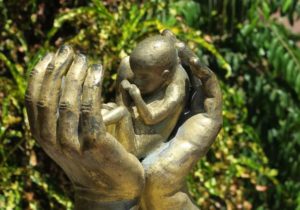“The line between lawful and unlawful abortion will be marked by the fact of having sensation and being alive.”- Aristotle
Even in ancient Greece, mankind struggled with the debate over abortion, and 2300 years later it’s still as thorny an issue as ever. As increased scientific capabilities allow researchers to delve even more deeply into the intricacies of developing human life, the voices of religious leaders, politicians, and activists have boiled to fever-pitch. With such complex issues as controversial biological findings, conflicting views of morality, and the protection of human rights, an easy resolution to the debate seems impossible. It is helpful, though, to study the issue from a variety of different positions. A Buddhist view of abortion combines teachings on life, suffering, and the nature of the self to provide some helpful insights.
Classic Zen Koan
In a classic Zen koan, the student is asked by his teacher “What was your original face, before your parents were born?” In the Zen school of Buddhism, koans are akin to riddles intended to jar the mind of the spiritual seeker away from ordinary patterns of thought in order to attain enlightenment.
Many insights can be realized when contemplating this koan, but it is particularly relevant to abortion with its idea about when life actually begins. Your “original face before your parents were born” suggests that existence on Earth is dependent on the perfect alignment of numerous factors, the perfect storm of sub-atomic interactions, cell divisions, and interaction of life forms for millions of years to culminate in your existence. Furthermore, this koan addresses the concept of anatman, or “no-self”. Buddhism teaches that rather than possessing an individual, immortal soul, a being’s life is dependent on the co-existence of the five skandhas (or five aggregates) of form, feelings, perceptions, mental formations, and consciousness.
The Beginning of Life through conception
On a more practical level, though, most schools of Buddhism acknowledge conception as the beginning of life, and all life is highly valued within the code of Buddhist ethics. In fact, the first precept of Buddhist morality is to “refrain from taking a life; to avoid killing.” Since a Buddhist generally accepts that life begins at conception, the abortion of a fetus is certainly a decision not to be made lightly and should be avoided if at all possible.
 Keeping in mind the reverence with which a Buddhist views life, its stance on the morality of abortion is not an absolutist blanket condemnation. Buddhism acknowledges that all individuals face a unique set of circumstances, and the burden of the final analysis of the right course of action in any situation rests squarely with the individual. In an interview with the New York Times in 1993, the Dalai Lama said, “Of course, abortion, from a Buddhist viewpoint, is an act of killing and is negative, generally speaking. But it depends on the circumstances.
Keeping in mind the reverence with which a Buddhist views life, its stance on the morality of abortion is not an absolutist blanket condemnation. Buddhism acknowledges that all individuals face a unique set of circumstances, and the burden of the final analysis of the right course of action in any situation rests squarely with the individual. In an interview with the New York Times in 1993, the Dalai Lama said, “Of course, abortion, from a Buddhist viewpoint, is an act of killing and is negative, generally speaking. But it depends on the circumstances.
“If the unborn child will be retarded or if the birth will create serious problems for the parent, these are cases where there can be an exception. I think abortion should be approved or disapproved according to each circumstance.”
Buddhism is a very unique and individualistic path that encourages people to realize the truth of its teachings through their own experiences and insights. As such, Buddhists don’t believe in the forcing of any ideology or will upon another. Though abortion is discouraged, Buddhism doesn’t condemn it outright. Instead, the Buddhist school of thought encourages understanding and compassion for the suffering of all beings, and mothers facing the difficult choice of abortion deserve loving kindness too.
References:
http://rcrc.org/perspectives/buddhism.cfm
http://www.bbc.co.uk/religion/religions/buddhism/buddhistethics/abortion.shtml
http://buddhism.about.com/od/basicbuddhistteachings/a/abortion.htm





